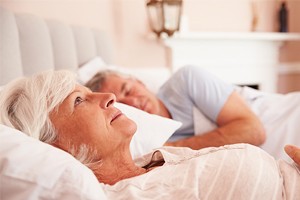 Poor sleep is a common complaint in older adults, and as we age, our sleep patterns tend to change. According to the National Sleep Foundation, “44% of older persons experience one or more of the nighttime symptoms of insomnia at least a few nights per week or more.”
Poor sleep is a common complaint in older adults, and as we age, our sleep patterns tend to change. According to the National Sleep Foundation, “44% of older persons experience one or more of the nighttime symptoms of insomnia at least a few nights per week or more.”
A good night’s sleep is one of the key factors to more energy and better health. Having trouble falling asleep and staying asleep can lead to physical and mental health issues, such a dementia and Alzheimer’s disease.
Before your physician can diagnose a sleep disorder, they will perform a thorough medical examination, review medications the person is taking, and speak to the person’s spouse or partner about their sleeping habits.
Many typically rely on over-the-counter (OTC) sleep aids to self-medicate themselves. Before seeking medication from your physician, try using these tips to get a peaceful night sleep:
- Keep your bedroom at a comfortable temperature and dark!
- Try to create a consistent sleeping schedule.
- Satisfy your hunger prior to bed.
- Avoid napping late in the afternoon.
- Make sure your mattress and pillows are supportive.
- Use your bedroom for sleeping only.
- Avoid drinking alcohol, caffeine and liquid before bed.
